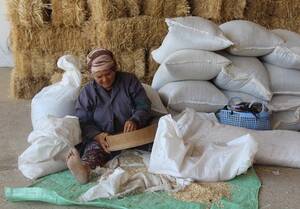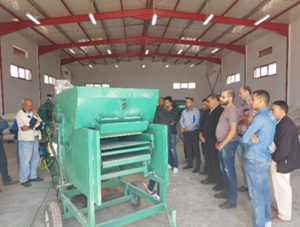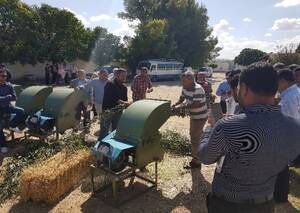Encouraging entrepreneurship with mobile grinders and seed cleaning machines

ICARDA is grateful to CGIAR's Research Program on Livestock and the International Fund For Agricultural Development (IFAD) for making this work possible.
By Zied Idoudi
ICARDA and its national partners in Tunisia are promoting entrepreneurship and rural businesses through providing farmer association with seed cleaning and treatment machines and mobile feed grinders, locally manufactured at a low-cost. The machines and grinders offer an innovative way to increase feed production and seed quality to enhance forage production across the country. Funded by the CGIAR Research Program on Livestock, the machines have been distributed to four farmer associations in Central and North-West Tunisia supporting over 1,000 small, mixed farmers.

(Photo: Zied Idoudi, ICARDA)
Due to the lack of quality forage seeds in the market and in order to avoid purchasing expensive quality seeds, small landholders in Tunisia traditionally rely on their own seeds to produce forage for their livestock. However, seeds cleaned manually usually means broken or small seeds in the product reducing its quality and subsequently resulting in low forage yields and income.
The mobile seed cleaning and treatment machine significantly increases the seed quality and can clean up to 800 kilograms of seeds per hour, depending on the type of seeds. As the machine can easily be transported around villages and sites, even remote farmers can now benefit from a significant improvement in seed yield and quality.

(Photo: Zied Idoudi, ICARDA)
ICARDA team developed a specific module to train end-users on the best technical skills for optimal use of the machines and continue to monitor data generated by the farmer associations on the number of beneficiaries, the cost-of-service provision, scaling to new villages for the farmer associations to generate income and establish a sustainable business model.
Ten per cent of the machine’s cost was paid for by the four benefiting farmer associations, who recognize the machines’ seed cleaning benefits and the entrepreneurial potential. ICARDA and partners selected the farmer associations based on their ability to deliver the services widely, and manage the machines, servicing, and other business considerations. The farmer associations are also demonstrating to beneficiary farmers the advantages of using the machine. The farmers’ monetary contribution is essential to create ownership and motivate them to develop good businesses.
ICARDA also presented 20 mobile grinders to young entrepreneurs and farmers’ associations in Northern, Central and Southern Tunisia. The grinders can chop and grind up to ten tons of cactus cladodes and fruits, as well as other feeding material like straw, hay, and fruit kernel, providing excellent and affordable livestock feed that would otherwise be less valorized and need more effort and labour. This overcomes a significant constraint for small-scale livestock farmers as it improves alternative feed availability and quality during droughts and feeding gap periods.
The service providers whether the farmer associations or young entrepreneurs can either use or sell the feed, or, like the seed cleaning machine, provide grinding services to other farmers for additional income. There is also added value to the grinders because they free up time for farmers, and especially women on whom the feeding tasks normally fall, so they can carry out other income-generating or household tasks.
The seed cleaning and grinding machines are good examples of people-centered research-for-development because ICARDA started by consulting with, and taking on board, the farmers’ needs, local knowledge and contexts. By putting farmers at the center of research in this way, ICARDA believes that the solutions that are delivered not only have a higher success rate but are more likely to be shared and scaled up across the region because the farmers are motivated by their own stake in the development.

To build synergies across different ICARDA projects, some of the beneficiaries were identified through other ICARDA ongoing projects such as the IFAD-funded Crop-Livestock Conservation Agriculture (CLCA) project which involves using conservation agriculture in crop-livestock systems in the drylands. CLCA enhances water use efficiency, improves soil fertility and delivers better productivity in Near East and North Africa (NENA) and Latin America and the Caribbean (LAC) Countries. Although CLCA benefited farmers in the project, they were still constrained by the lack of quality seeds so the cross-purposing of innovations between projects has resulted in extra impact.
On October 9th, 2019, ICARDA organized a training day at the National Institute of Field Crops (INGC) in Tunisia to demonstrate how the local manufacturer and ICARDA-INGC team operate the machine. Representatives from other national entities attended, such as the Agency of Livestock and Pasture (OEP), the Regional Offices for Agricultural Development (CRDAs), the Central Administration of Agricultural Extension Services and the Agricultural Extension and Training Agency (AVFA).
ICARDA is grateful to CGIAR's Research Program on Livestock and the International Fund For Agricultural Development (IFAD) for making this work possible.

Zied Idoudi is ICARDA’s technology scaling specialist (TSS) – CLCA Phase II project.
